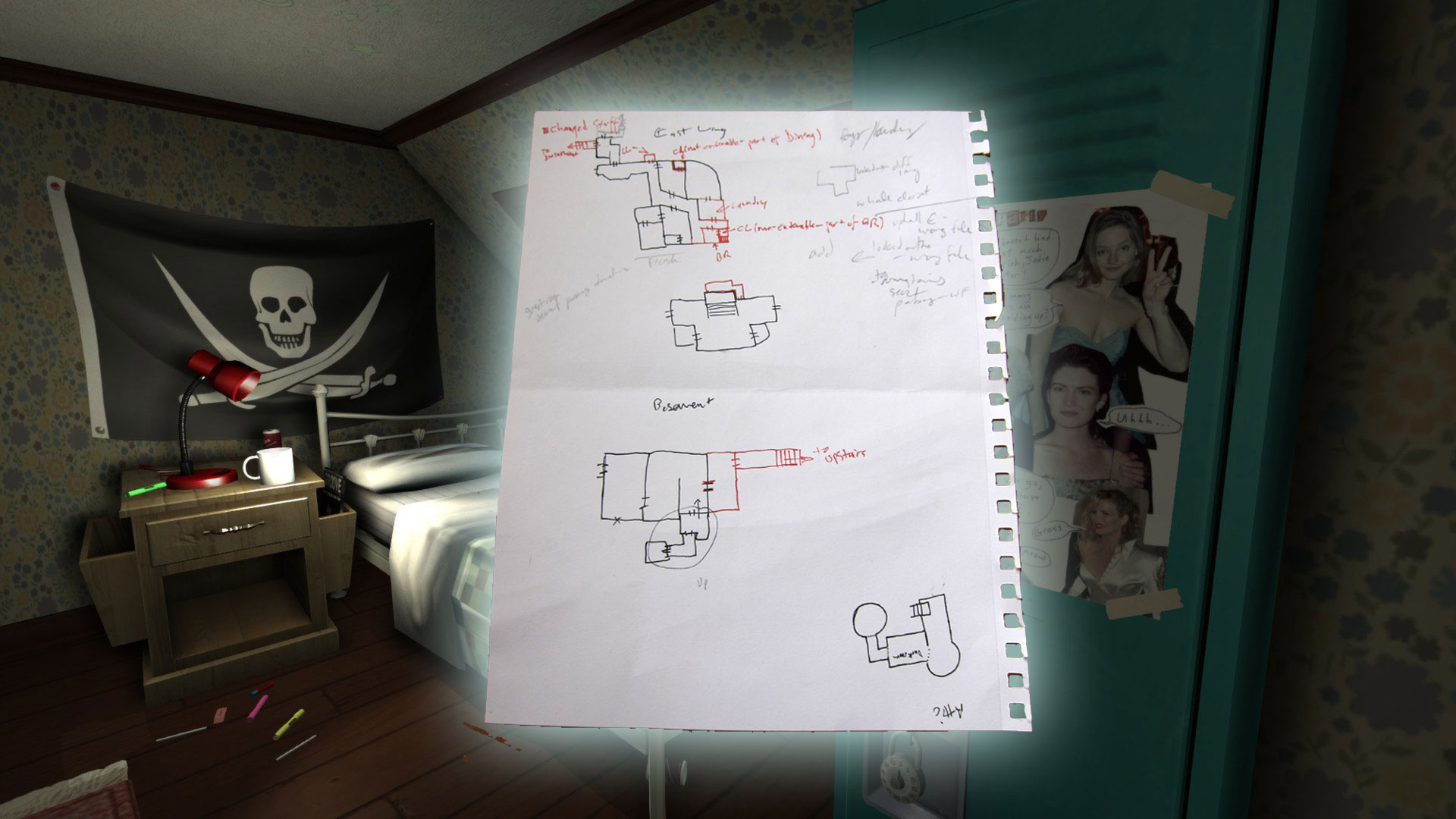ANIMAL’s new feature Game Plan asks video game developers to share a bit about their process and some working images from the creation of a recent game. This week, we spoke to Steve Gaynor of The Fullbright Company about Gone Home, an indie PC game that’s earned nearly universal acclaim for its nuanced storytelling and atmosphere.
It’s 1995. You’ve been away for a year, traveling Europe. While you were gone your family moved into a new house, a mansion inherited from a distant relative. You walk out of the rain and through the front doors of this alien-seeming building, not the home you knew, expecting a warm reunion but finding only half-unpacked boxes and silence. For the next three hours you pace the halls of this sprawling and honeycombed estate seeking the answer to one simple question: where did everybody go?
Gone Home is the type of personal, intimate story that people assume can’t work in video games. You never hold a gun; your avatar can’t jump; there are no enemies or battles. You’re simply a young woman, walking around her family’s unfamiliar home, trying to piece together the story of an eventful year for which she was completely absent.

The game was crafted by four individuals. Developer The Fullbright Company was founded by Steve Gaynor, Johnnemann Nordhagen, and Karla Zimonja in early 2012, and Kate Craig joined the team some months later. They have backgrounds working on more traditional games, like BioShock and XCOM—thinking persons’ games, despite all the shooting, but not like Gone Home. Gaynor explains:
We decided we don’t want to push people away by having combat, or you can die and you have to be good at it to keep going, or having crazy puzzles you have to figure out to proceed. We don’t have to answer questions like, ‘Who are you fighting?’ or ‘Who made this crazy puzzle with all these gears?’ or whatever’s going on. So we had the freedom to make it about a normal family that could have lived next door to you. Most games just don’t have that luxury because you are doing all of this stuff in the game mechanics that doesn’t have any relation to everyday life.
The player’s character, Katie, is not the protagonist. As in so many other games, she’s essentially a vessel for players to inhabit as they explore the game world and learn about the other characters. But the house, her family’s whereabouts, and the goings-on of the previous year are as much a mystery to her as they are to you; unlike in other games there’s no dissonance there, something Gaynor says was important.
I think it is really common, if you’re playing a game, to be like, ‘I’m driving this person around, but why do they know stuff that I don’t know? I’m in their house that they grew up in, so why do I not know my way around, but they do?’ … So you, the player, and Katie, the character, have both not been there for a long time and don’t have any knowledge of the events that happened in the interim, so you can feel like you and the character are both experiencing these things in the same way as you play through the game.

Exploring the house, Katie finds old letters, crumpled manuscripts, diary entries, cassette tapes of licensed riot grrrl songs, and, most importantly, notes left to her by her sister, Sam. The stories of her parents and her mysterious, late great uncle are interesting, but they’re white noise compared to the more prominent tale of Sam, the real star of Gone Home. Sam is younger than Katie, and while her older sister was finding herself in Europe, Sam was coming into her own.
She discovers music, sexuality, and rebellion, finding love and struggling to relate to her parents. Summarizing at all does the game a blasphemous disservice, because her story unfolds in nuanced and beautiful ways over the course of the game—unexpectedly so, since it’s hardly typical of what’s normally seen in this medium. It will break your heart. Credit goes to the writing, and Gaynor says the unconventionally mundane gameplay and setting helped.

There’s a very high bar, I think, for people to actually give a shit and be drawn through the game because of the writing. Most games that you play, you play them to play them, and if they have good stories then that’s great, but it is rare. And I think that part of that is that it’s hard to write a story that is compelling and relatable when what you’re doing in the game is just killing people every five minutes.

On some level it is way easier to write something that is compelling if you can just kind of put yourself in the shoes of a kid who’s in high school writing a note to their friend, or a guy who, you know, is getting rejected by his publisher. And what does it sound like when you get a letter like that, that’s saying you’re not doing good enough, you know? Just putting myself in that head space I think is something that is at least more approachable than saying, like, ‘Alright, I’m the guy whose family just got killed by mushroom-zombies, and how does that feel?’ It’s like, I don’t fucking know how that feels.
Gone Home is available for Windows, Mac and Linux on Steam or GoneHomeGame.com.
Michael Rougeau is a freelance writer with words in Complex, Kotaku, and TechRadar.


